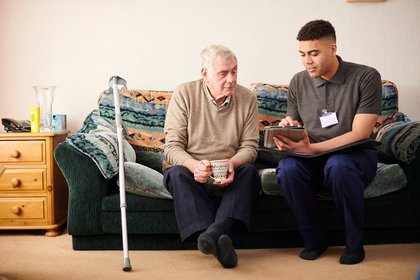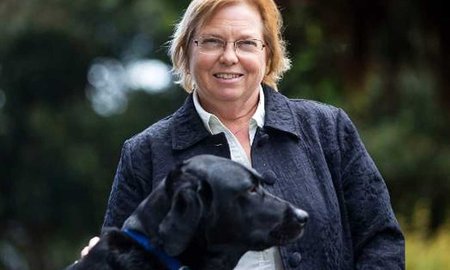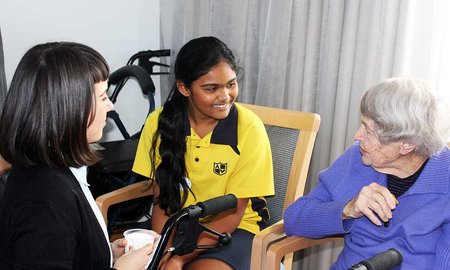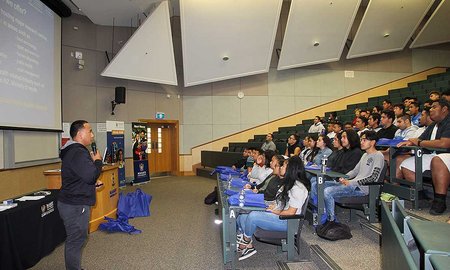
Speech therapists work with people of all ages who have communication challenges with their speech, language or voice or swallowing disorders.
To help combat the dire shortage of speech therapists in New Zealand, Te Kunenga ki Pūrehuroa Massey University is shifting its entire training programme online from 2024 so it becomes accessible to all students no matter where they live.
Speech Language Therapy Programme Director Dr Mershen Pillay says there are currently 100 speech therapy jobs unfilled in New Zealand.
“Clients can be on a waiting list for up to a year, especially in the regions. There’s a dire need for speech therapists and our graduates are almost guaranteed to get a job.”
The online delivery of the undergraduate training first began in tandem with on-campus lectures in 2021, in part because of the COVID-19 pandemic, but also to make it easier and more affordable for students outside of the major cities to enrol without having to leave home. The number of distance students has steadily increased, with very positive results.
Work-Integrated Learning Coordinator and Co-President of the New Zealand Speech-language Therapists’ Association Emma Quigan says Massey's distance students are blowing the speech therapy sector away with the quality of their work.
“I get wonderful feedback from people saying ‘This student is amazing. Is there a way they can sign something so they stay with us?’ It’s been very affirming. Our relationship with distance students has been just as strong as with those on-campus. In 2024 we want to increase the number of students and create a quality education that is equitable regardless of ethnicity, gender, age or where you live.”
Speech therapists work with people of all ages who have communication challenges with their speech, language or voice or swallowing disorders, often as a result of brain injury, stroke, degenerative disease or diagnosis of autism. They also work with transgender clients, helping their pitch align with the gender they identify with. The capacity to build a trusting relationship between the speech therapist and the client is all important.
Dr Pillay says it’s a wonderful profession that you'd never get bored in.
"You can move between health, education and social services. You can work at the level of the individual in their home, or with community organisations, hospitals, agencies and schools.”
South African-born Dr Pillay has worked in the field for 30 years.
“My mother was a wheelchair user. My entire life I grew up with people with disabilities around me. Today there’s been a shift in thinking about disability as a deficit. We are reorienting ourselves to focus on our clients’ strengths. We look at how they can live with what they have, using a whole range of strategies and therapies from behaviour modification to cognitive-based approaches and alternative means of communication like picture boards.”
Ms Quigan says like Dr Pillay, many students are drawn to speech therapy because of a personal experience with disability. She hopes that the new online programme delivery will encourage more diversity in the student body and help recruit more Māori and Pasifika students in particular, as well as more males and more students of Asian ethnicities.
“Because of inequities in health and education, Māori are more likely to need the services of a speech therapist, for example after experiencing a stroke. Few speech therapists can kōrero Māori. If you are Māori you are currently unlikely to get a speech therapist who looks, thinks and talks like you."
“We take that very seriously and spend a lot of time teaching Māori health models and understanding of wellbeing so our students can make a better connection with patients," she says.
Students are selected by interview.
Dr Pillay says that provided they meet university entry requirements, including English language requirements, they don’t look at academic subjects or grades.
"We look at the student’s ability to communicate and their interest in the profession. We assess their potential to be a good speech therapist.”
Students can undertake full-time study for their Bachelor of Speech and Language Therapy with Honours for a minimum of four years or part-time for a maximum of eight years.
The university’s Stream learning platform offers short online recorded lectures and a set of learning tasks and activities which can be done at a time that suits the student. Over the course of their degree, students spend about 300 direct contact hours with patients, clients and the community.
“It’s less about telling students what to do and think than guiding them through the competencies they need to develop to be effective. We are constantly shifting as a profession. What’s appropriate today may be seen as wildly inappropriate four years from now," Ms Quigan says.
Tutorials offer the opportunity to ask questions and bring in the student’s own perspective. Auckland, Palmerston North and Wellington-based distance students can still access university facilities on campus.
Ms Quigan notes that New Zealand has about 22 speech therapists per 100,000 people.
“In Australia they have double that and they have declared a sort of national emergency in terms of the workforce shortage. One of their solutions is to actively pursue our graduates.
“That’s another reason why distance learning works because we’re training people who are already set up in their own community and who are wanting to give back. They’re training because they want a solid job where you get a lot of satisfaction from what you do.”
Related news
Challenges of parenting disabled children during a pandemic
Two Massey researchers are calling for more support from the Ministry of Education and disability support agencies.

Teaching kids how to help remove stigma of dementia
Albany primary school pupils are honing their communication skills with the help of Massey University Speech Language Therapy students.

South Auckland students explore Health career options
Around 50 Pasifika Health Science Academy students spent time at Massey's Auckland campus exploring health careers and getting hands-on experience as part of the first Health Alliance Day.
